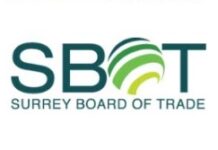THE Greater Victoria Chamber of Commerce, Surrey Board of Trade, Alberni Valley Chamber of Commerce, and Campbell River and District Chamber of Commerce sent a letter on June 15 to Attorney General David Eby requesting that the board of trade/chamber of commerce industry be exempt from the BC Lobbyists Transparency Act.
Anita Huberman, President and CEO, Surrey Board of Trade, said on Monday: “This is yet another request to the BC Government by the board of trade/chamber of commerce industry to remove the red tape of the Lobbyists Transparency Act, which makes doing our job almost impossible. The mandate and purpose of boards of trade and chambers of commerce is to instigate change at all levels of government.
“As we have ongoing, sometimes daily, conversations with political representatives to help business, the burden of reporting with the new lobbying rules increases our administrative burden. This is red tape that is not needed now, and not needed in the future for our industry.”
Bruce Williams, CEO, Greater Victoria Chamber of Commerce, noted: “Chambers of commerce and boards of trade are embedded in the fabric of our communities. Our mandate is to give voice to business. In healthy communities, the public sector and private sector co-exist in a balance that creates employment and healthy economies and enables sound policies.
“This isn’t new, but it is being threatened by onerous requirements that miss their target. We are putting historic relationships at risk with this paternalistic red tape that is effectively censuring important conversations.”
Bill Collette, CEO, Alberni Valley Chamber of Commerce, added: “Chambers of commerce are organizations that are vital to the collective well-being of the business community, and the public at large. The lobbyist registry discourages our participation due to the burden of the reporting requirements which many of us simply don’t have the capacity to manage.
“We ask that the government recognize the importance of our role and set up systems that encourage, rather than discourage, valuable input from organizations like ourselves.”
Mary Ruth Snyder, Executive Director, Campbell River and District Chamber of Commerce, said: “We, the boards of trade and chambers of commerce, are the intersection point between businesses, all four levels of government, education institutions, community organizations, the greater community and First Nations — providing a platform and a voice for those who may not otherwise have either. The current level of red tape is completely detrimental. It inhibits the voices that need to be heard to ensure effective governance by our elected leaders.”
According to the board of trade/chamber of commerce industry says Lobbyists Act causes red tape, muffles voice, in 2020, significant changes to BC’s lobbyist registration regime came into effect. These latest reforms were statutory and regulatory. Statutory, because the implementation of the Lobbyists Registration Amendment Act, 2018 will transform the Lobbyists Registration Act into the Lobbyists Transparency Act. Regulatory, because the Lobbyists Transparency Regulation will replace the Lobbyists Registration Regulation.
It says that this means that if you communicate with BC government officials as part of your business or organization, the revised rules apply. Under the new rules, violations could result in monetary penalties of up to $25,000 and a ban on lobbying of up to two years.
It asked the Ministry to consider four ways to improve the Lobbyists Transparency Act 2020:
1. Update the definition of “small organization” under the Lobbyists Transparency Act 2020 from six employees or less to 25 employees or less.
2. Amend the Act to provide full exemption for all “small organizations,” regardless of membership-base composition or issues-based organization.
3. Alleviate the degree of obligation under the Act for organizations if they are sector or cross sector-based, rather than singularly company focused by:
a. Only requiring the registration of an actual act of lobbying (letter, meeting, policy decision) upon completion, increasing the 50-hour threshold to 200 for charities and not- for-profits, and eliminating the requirement for chambers of commerce and boards of trade altogether;
b. Establishing a more streamlined lobbying tracking report form and process; and,
c. Removing accumulated lobbying reporting requirements when working with other organizations.
4. Provide greater resources for education and training for the not-for-profit sector, small organizations and chambers/boards of trade to understand the new Act and comply, including how to fulfill reporting requirements.
Read the letter here https://businessinsurrey.com/












